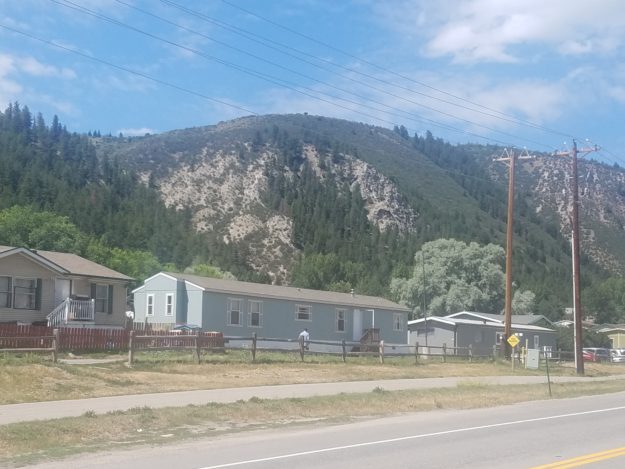Widgetized Section
Go to Admin » Appearance » Widgets » and move Gabfire Widget: Social into that MastheadOverlay zone
Eagle County hosts state meeting on tough new mobile home park regs

Editor’s note: A version of this story first appeared in the Vail Daily.
Eagle County Friday will host a Colorado Division of Housing meeting for mobile-home owners renting space in mobile home parks, park managers and owners, local government officials and any other parties interested in how best to implement the state’s new Mobile Home Park Act.
Passed by the legislature last session and signed by the governor in May, the new law gives mobile-home owners more time to sell or move their homes after eviction, grants county commissioners more regulatory authority over mobile home parks and sets up a resolution and enforcement program for disputes between renters and park owners.
Open to the public, the meeting will be from 2 to 5 p.m. on Friday in the Eagle County Room of the Eagle County building at 500 Broadway in Eagle. Click here to stream the meeting online or call in at (669) 900-6833 or (929) 205-6099 (webinar ID 174 564 991).
In the last of a three-part series in July, the Vail Daily explored the new law and how it might impact local mobile home parks such as Eagle River Village in Edwards, where numerous home owners who rent space in the park complained of poor water quality and other safety issues.
Several Eagle River Village residents spoke to the Vail Daily on the condition of anonymity out of fear of retaliation and possible eviction by park ownership and management.
The Colorado Department of Regulatory Agencies, asked to review whether park owners or managers should be licensed by the state, found “harm occurring in some mobile home park settings.” DORA recommended enforcement of existing laws, and that became the basis for the new law’s dispute resolution and enforcement program.
Now the Division of Housing is tasked with implementing the program, which will require mobile home parks to register with the state by Feb. 1 and will begin receiving and resolving complaints of alleged violations beginning May 1.
Friday’s meeting is part of a rulemaking process to clarify statutory requirements, and draft versions are available in English (here) and Spanish (here). The new Mobile Home Park Act (HB 1309) is also available in both English (here) and Spanish (here).
According to a state PowerPoint presentation, failure to register a park by the deadline or comply with an agency order stemming from a complaint could result in fines of up to $5,000, while retaliation against residents filing complaints could carry fines of up to $10,000.
Marko Vukovich, vice president of asset management for Ascentia – the Denver-area firm that owns Eagle River Village – said his company will either have representatives in attendance for Friday’s meeting or will phone in.
Vukovich said in late August that the company is working to address resident complaints about aesthetic issues with the park’s well water, which meets state safety standards.
“We have always worked with state and private engineers to ensure the quality and safety of our water at Eagle River Village and continue to do so,” Vukovich said. “We have communicated extensively with our residents and engineers as our investigation of water complaints continues and we work to understand concerns.”
Eagle County Manager Jeff Shroll, who invited Ascentia to Friday’s meeting, said he’s met and talked with company and state officials multiple times since the Vail Daily series and has personally taste-tested the water, He said it has slightly elevated sodium levels but does not look, taste or smell bad.
As of mid-September, Shroll said Ascentia had identified three or four mobile homes in the park with water issues that all have been attributed to individual home infrastructure such as bad water tanks or pipes.
Shroll said he went through a 2017 survey of park residents conducted by local nonprofits that listed water quality and bad roads as the top two concerns in the park, and Ascentia acknowledged some issues that need to be fixed.
“We talked about everything that showed up on that
[survey]
list, and I thought that was something they were really open to trying to address,” Shroll said of Ascentia. “Are they going to spend $4 million to $7 million and tie into the [Upper Eagle Regional Water Authority’s] water? No. Do they need to? I don’t think they need to.”
A deal using some public and private funding to connect the park to the local water system fell through in April.
Shroll also has his doubts about any new regulatory authority for counties in the new state law.
“It still seems like I kind of want to wait and see who’s going to pull that enforcement trigger and what that lawsuit’s going to look like,” Shroll said.
State officials did not return emails and phone calls requesting additional comment on Friday’s meeting.


